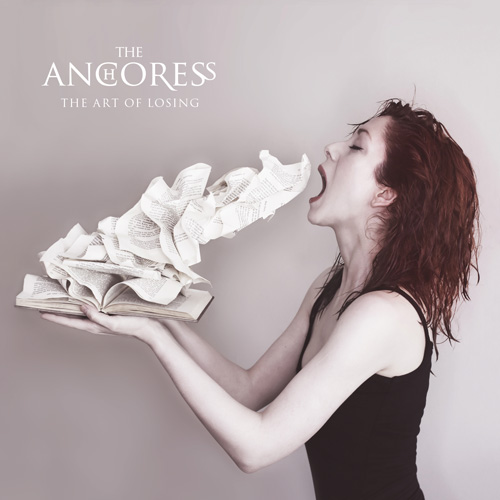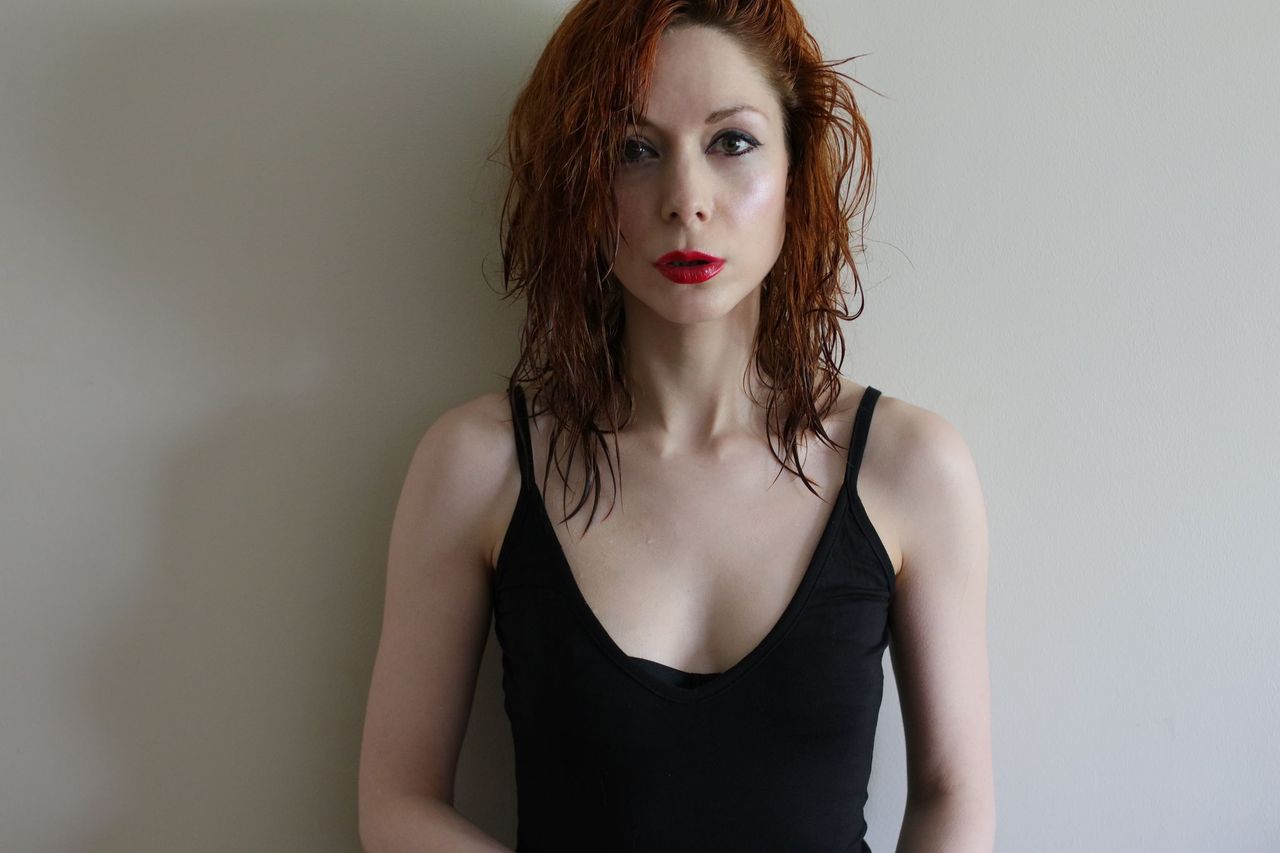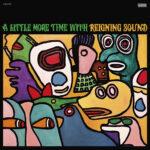The Anchoress’ Art of Losing‘navigates the detritus of death’, its press release states somewhat bluntly.
Composer, multi-instrumentalist and producer Catherine Anne Davies aka The Anchoress created her new record, the follow-up to 2016’s Welsh Music Prize-shortlisted Confessions of a Romance Novelist, following the death of her father and multiple baby losses, all swiftly followed by the trauma of a major health issue of her own. The album was birthed as she emerged from initial grief and navigated her bereavements and their effects both long and short term.
When I speak to Catherine, it is 18 months ago almost to the day since my husband died. Getting to know Art of Losing over the previous week generated a painful personal sense of déjà vu, not unlike like someone pushing their thumb on a bruise.
Feelings previously within in my own head and heart are echoed back at me; bereavements and ongoing recoveries are different for everyone, but there’s a sense of familiarity anyway. Whether you watch the man you’ve loved most of your adult life with slowly fade and die, like in my case, or Catherine’s sudden, savage experience of baby loss over and over, upon exploring the album it is clear there is so much common ground on the record for anyone recovering from the loss of a loved one.
Catherine is in her mother’s house in Buckinghamshire when we talk. She sits in her studio surrounded by stacks of music gear, the result of that common addiction amongst musicians – bidding on eBay.
‘It’s all a bit Rick Wakeman, multi-tiered,’ she admits with humour. ‘Some synth comes up and you forget in the morning that you’ve bought it.’
The record was produced by her in her own studio, the fact stated on the album in clear print for reason. We’re in 2021 but the common assumption that when a woman makes an album then a man is secretly responsible for it somehow, despite evidence to the contrary, endures.
‘If hundreds of (women) do it, in time you’ll see the trickledown effect,’ she says of the statement. ‘It’s being vocal and being a bit of a dick about it. It makes me cringe have to do it, and put it in my twitter bio, I have to put it as the first line of the press release. When the last single went up somebody congratulated the guy who mixed the track on the production. It happens so often. It’s wearing.’
The Art of Losing is a very female record, a raw album that pulls from a female experience. It’s dark and beautiful but savage too. What else could it be, given the subject matter?
Catherine isn’t, she tells me, someone who typically finds it easy to completely expose herself. Her output on the first record, the blending of the fictive and the autobiographical, confirms that. Anyone navigating the journey of grief knows its pain, and as adults all of us are forced to work through it as some point. Yet how we are dealt with as the bereaved is awkward and unwieldy, ‘time is a great healer’ platitudes of denial endlessly repeated as if saying them multiple times makes them true. Nice theory; only thing is, as days turn to weeks to months to years, the pain is not rubbed out, it can’t be wished away.
‘The one thing I wanted to do with this record was to force people to talk about it, force people to confront things that are uncomfortable,’ says Catherine, recalling a meeting with her record label early on in the recording process and talking a little bit about the subject matter and seeing the men recall in horror and telling her “not everyone wants to talk about that”.
‘Everyone’s got their own way of dealing with things but you also can’t police other people, and say you can’t talk about it. The one positive thing out of COVID is maybe as a society we will get a little more comfortable talking about grief, about death and premature death. The climate has shifted.’
The process of grappling with the reality of loss makes the bereaved difficult to communicate with sometimes and in tune with that, Catherine found herself not wanting to work too closely with other people on the record. Her baby losses were a private matter to her back then, she explains. This made her feel even more isolated as a result.
‘I just didn’t tell most people, which probably compounded a lot of problems. I kept it all very secret at the time. And I think I was just a real physical and mental mess.’
She went through multiple surgeries for a cervical cancer diagnosis on top of the emotional impact and fallout of the deaths of her father and unborn children, meaning solo working proved to be a practical option.
‘The physically grueling nature of it meant I couldn’t trek to a studio or travel lots, I needed to be in my own space. I had to work at my pace.’
It could be interpreted as ironic she didn’t want to discuss the horrors of her personal life at the time but making a record about it and now being interviewed about it and talking freely?
‘I think that’s different, I have more control over the discourse, when you make a piece of work and put it out into the world, it’s not a conversation. I’m not inviting people to then comment on my experience. It’s two ways of exploring and expressing your loss, having a conversation in a room inviting people to say the wrong thing , or putting everything you want to say in a piece of work and putting it out. I needed that control. It was more about working it out for myself.’
Her bereavement and the making of this record are intrinsically linked on every level. It’s a familiar story for albums in 2021 to have sat on a shelf for a while and true to form, Art of Losing was completed two years ago this month. But its delayed release is due in part anyway, to her personal circumstances.
‘I remember listening back to the final mixes in the car in the supermarket car park and I was hysterical, I couldn’t listen to it, it was too much. I was, I can’t put this out yet, this is not good for me, it’s not right for me.’
And yet the actual process, the work of making the record was useful to her personally, a means to get through each day. Having something to focus on, she says, really helped.
‘I think people see grief and loss as a trajectory of recovery, things get better and it’s just not like that. It’s just messy.’
She wanted to create that very sense of chaos on the record, the thousand emotions of grief exploding within her in one single day. On ‘Paris’ we hear three voices, a woman, man and child with competing narratives, having a disorientating effect.
‘I wanted to capture what it feels like, to be in the eye of the storm when it comes to loss.’
It’s true the 5 stages of grief – denial, anger, bargaining, depression and acceptance – aren’t always linear, each can punch through when not expected. Catherine found it a challenge as she searched to find her own anger summed up in an art forms, before settling on Dylan Thomas’ instruction to “rage against the dying of the light” in what is his most famous poem, ‘Do not go gentle into that good night’. How telling that the poem is 70 years old now, and makes one wonder if it is so well loved and cherished because the sentiment is not commonly acknowledged elsewhere.
She was ‘really bloody angry’ after her experiences. ‘And defiant in the face of it too. My reaction wasn’t just to feel sadness. There was a lot of rage’ and didn’t want was to create a sad, sombre, downtempo, slow record.
‘I wanted to capture the multiplicities of energies in life and celebration of it alongside acknowledging that death and loss is something we all go through. Obviously towards the end of the record itself when I was told I had cervical cancer you’re confronting your own mortality too. I was so angry at that point, this is not going to happen to me, I don’t accept this. No, not after everything I’ve been through. Furious with the universe. It was the poem that captured that energy for me. It wasn’t about accepting it and saying “I’m really sad”.
From the listener’s perspective The Art Of Losing highlights this very well, the sense of chaos and confusion and all the contradictions. Working on the record, did she find it cathartic?
‘I’m really uncomfortable with the idea I guess that music is therapy in some way because I think therapy is therapy, music is music,’ she tells me. But, ‘when you’re writing something you’re trying to make sense of it as a songwriter so it helped me process. As a writer I had no choice but to write something, what else could I do? Maybe I could’ve taken up knitting. Or leant to cook,’ she smiles wryly. ‘But a painter will paint, a writer will write, a musician will make music.’

We talk a little about the physical impact of grief, how it affects our bodies. No one ever talks about that, or warns us up front. It’s a terrible shock. The artwork on The Art of Losing’ sees Catherine vomiting, albeit in a rather more photogenic manner than real life.
‘I needed to vomit it all up,’ she says matter-of-factly. ‘Grief is so physical we focus so much on emotion we don’t focus enough on the physical manifestation of it. For me, there was a lot of vomiting, I don’t know about you. It’s so shocking. And the physical pain, it’s unreal. It’s not beautiful and sad and mournful.’
The song ‘5am‘ holds all this up as fact, boldly, and spares us nothing. The album is honest anyway, but ‘5am‘ is the most so? Describes graphically the process of baby loss, how the body reacts to sexual abuse; in it, she cleverly twins and contrasts the two.
‘I wanted to capture the physical gruesomeness. I almost took it off the record. It felt that little bit too exposing but it protested and wanted to go on there!’
Necessarily graphic, she tells me, because both are common experiences shared by so many women. She isn’t claiming her story to be unique, on the contrary.
‘It’s not just about me, it was about my friends and every woman out there who’s experienced these things. I wanted to talk about the commonplace nature of it, hence why the chorus repeats itself, how the female experience can be so brutal and violent. I’m talking about sexual assault, I’m talking about baby loss. I didn’t want to focus on the emotions, I wanted to focus on “the red red blood dripping on the carpet”. Let’s not sanitize this. This is what it feels like, to have these things happen to you.’
The Art of Losing by The Anchoress is released Friday 12 March via KSCOPE




